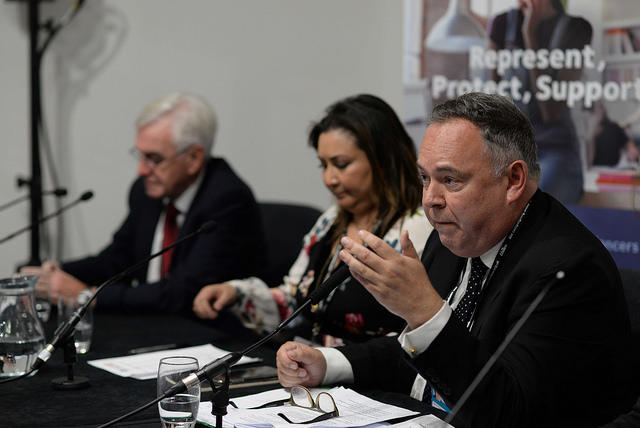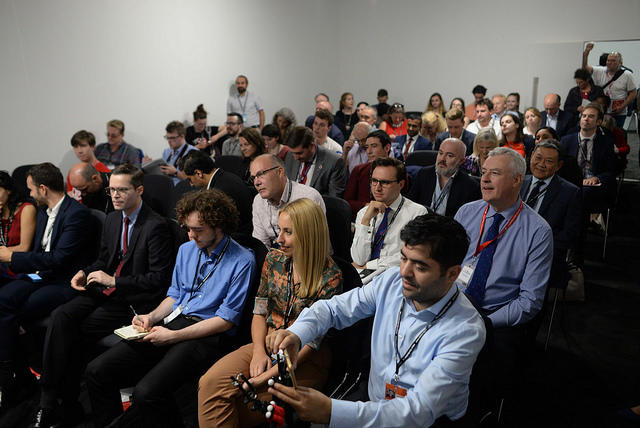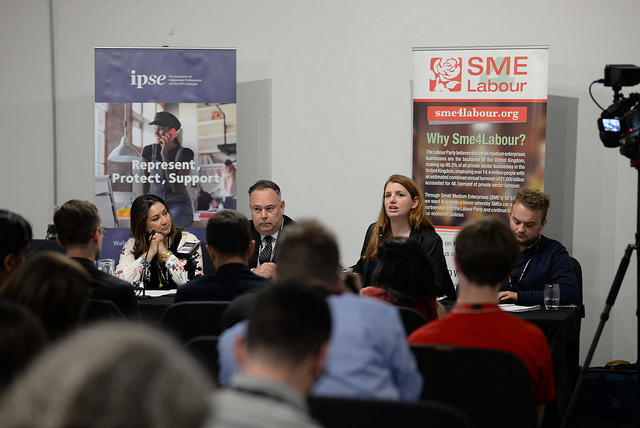- Home
- IPSE News
- Latest news
- IPSE at Labour Conference
Latest news
IPSE at Labour Conference
- 27 Sep 2018
Brexit. Brexit. BREXIT. Reading the news, you could be forgiven for thinking there was just one topic of conversation at the Labour Party’s annual conference in Liverpool. But as the IPSE team can tell you, there was much more going on than that. IPSE organised two packed-to-the-rafters events on self-employment – one with the Co-op Party and the other with the legendary Ibrahim Dogus’s SME4Labour. IPSE even managed to get John McDonnell as a panellist for its SME4Labour event, where the Shadow Chancellor was quizzed on IR35.

Both IPSE events were on Tuesday – towards the end of conference – so before that there were two days of networking, policy discussions and generally soaking up the atmosphere of one of the biggest and busiest conferences in Labour’s history. And, if at times there was a sense that the party was trying to keep the lid on a pressure cooker of Brexit debates, there was also plenty of discussion about the future of the economy and the country.
The general atmosphere was certainly different to last year – and several million miles from the pre-Corbyn years. There was still tension in the air, both because of the lingering poison of the party’s summer scandals and because of the number of moderate MPs who were conspicuously absent. There was also, however, if you’ll pardon the pun, a sense of momentum. As just about every column has commented, there was the sense that this was a party seriously preparing for power.
IPSE’s first event at Labour conference – with the Co-op Party – was in the imposing Pullman Hotel. There, IPSE’s own Simon McVicker was speaking alongside Alison McGovern MP, acting Shadow Minister for Labour Justin Madders MP, Isabelle Gutierrez of the Musicians Union and Philip Ross of the Centre for Research into Self-Employment (CRSE). The event was chaired by the General Secretary of the Co-op Party, Claire McCarthy
Called ‘Making Self-Employment Work: Co-Ops, Trade Unions and the Self-Employed’, the event was, if anything, even broader than the title suggests. While Simon covered everything from late payments and universal credit to vulnerable work and the dangers of over-strict regulation, Isabelle delved deep into the platform economy and the trials and tribulations of the original gig workers, musicians.
Philip Ross, bridling just a little at the six-minute time limit, dwelt mainly on the struggle to have self-employment recognised as just as legitimate as employment. Meanwhile, Justin Madders focused on the blight of vulnerable work and called for more regulation to make sure it isn’t just tribunals that are defining self-employment. The panel’s other MP, Alison McGovern, had a slightly more positive message, saying the future of self-employment lay in co-operation and unionisation.

The panel was standing room only – and even more busy than many events at this year’s packed conference. Some people even crowded around the door to listen in from the corridor.
If IPSE’s Co-op Party event was standing room only, our SME4Labour Question Time felt like it was sardine tin squashing only. One reason may be that IPSE managed to get Shadow Chancellor John McDonnell onto the panel. He was joined by journalist Adam Payne, the omnipresent Alison McGovern MP and IPSE’s Simon McVicker. Comedian and former advisor to Ed Miliband Ayesha Hazarika chaired the panel.
As often happens with senior politicians (Corbyn, for one, began his leader’s speech 15 minutes late), McDonnell didn’t quite make the beginning of the event. Instead, it was up to Simon, Adam and Alison to tackle the issue of poor payment culture. Simon led the charge on this one, revealing – to audible gasps from the crowd – that the average freelancer loses over £5,000 a year to non-paying clients. For him, the solution was giving the Small Business Commissioner real teeth to track down and fine persistent offenders. Alison McGovern also proposed “using the banking data we have to find out who is paying late”.
Next it was on to Labour’s plans for the gig economy, where Simon warned that the party must not adopt “catch-all solutions” that would harm all self-employed people. He pointed out that actually the majority of self-employment is outside the gig economy – highly skilled and productive workers. As he put it, “don’t kill the goose that lays the golden egg”. To tackle exploitation in the gig economy and false self-employment, both he and Alison McGovern called for a statutory definition of self-employment
McDonnell, however, said Labour would guarantee hours and security for workers in the gig economy. He said the situation was “outrageous” and “we can’t continue in a society that has such levels of low pay, exploitation and abuse.
Before long, it was on to the dreaded “B” word. A visibly exhausted and exasperated McDonnell said the Brexit situation is “a God-awful mess.” He said of the Conservative Party: “We just don’t know which faction is control one day to the next. I just want to get rid of them.
Rising more to the issue, he said he was “furious” about it and thought SMEs and the self-employed should “express their fury” too. Simon and Alison broadly agreed on this, with both saying they did not think the voices of small businesses and the self-employed were being heard in the debate.

Getting into the “B” word has repeatedly proved to be a… risky business… for Labour, however, and IPSE’s event was no different. Business Insider reporter Adam Payne quickly took McDonnell to task, saying the party’s stance on Brexit was “cherry-picking” and that it had a “constitutional and moral obligation to provide a more coherent and detailed alternative.” McDonnell shot back that “any form of negotiation can be interpreted as cherry-picking.
Next came the burning question about the changes to IR35: what would a Labour government do about them? Well, McDonnell was distinctly non-committal, telling Philip Ross, who asked the question: “I know you were part of the working group we had before. Well I think we’ll be moving onto these issues fairly quickly now, and we’ll be seeing whether we can get some dialogue from government on this. Pressure is on Philip Hammond now to start addressing some of these aspects that HMRC are throwing up.
Simon was more robust on the matter, saying very clearly that “if the government are going to change it [IR35] in this way, they need to do the decent thing. It’s unfair if you tax someone as an employee, it’s unfair not to give them employee rights.” Stephen Kinnock MP, who joined the panel late after Alison McGovern left, said: “we need an active state that is not micromanaging business but giving them an opportunity and platform to get the advice and support that they need.
A somewhat mixed message from Labour then – both on Brexit and on self-employment. There is certainly some cause for concern in McDonnell’s talk of guaranteed rights and hours in the gig economy (something which IPSE raised with the Shadow Chancellor on the Today programme on BBC Radio 4). But at the same time, a more sympathetic McGovern was at pains to stress: “there are a lot of people in the Labour Party who understand SMEs, who are freelancers, and who are also worried about Brexit.”
The Labour Conference definitely produced much food for thought. But will Labour offer a better approach to self-employment? If it does adopt a heavy-handed, “catch-all” approach to the gig economy and the wider sector, that seems unlikely. Whatever the future holds, however, you can be sure IPSE will continue to defend the self-employed and represent their best interests to governments of whatever stripe.
Meet the author

Tristan Grove
Head of Communications and Policy Engagement
Find out more about our work
